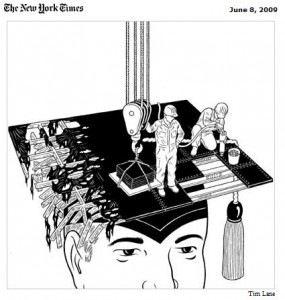 The article in the op-ed section of the paper today Five Ways to Fix America’s Schools had some interesting ideas, but jumped so fast into “how” to fix the schools, I was sorry there wasn’t more about the problem, the “what” that is evidently so broken.
The article in the op-ed section of the paper today Five Ways to Fix America’s Schools had some interesting ideas, but jumped so fast into “how” to fix the schools, I was sorry there wasn’t more about the problem, the “what” that is evidently so broken.
The author, a former New York City Schools Chancellor, Harold O. Levy starts out well with a problem statement:
American education was once the best in the world. But today, our private and public universities are losing their competitive edge to foreign institutions, they are losing the advertising wars to for-profit colleges and they are losing control over their own admissions because of an ill-conceived ranking system.
The assertion that education here was once in the world is an interesting one, and I don’t know how that’s quantified, but by calling out an “ill-conceived ranking system” as a cause of loss of control, why wouldn’t it make sense to get a better ranking system first, so we can see what is, and isn’t broken, before we start talking about “how” to fix it?
Where I would start is where I left off on the last “how” trap@home blog entry which was about parenting. In education today, so much has changed and continues to change so fast, do we even know what skills and knowledge students of today will need to lead happy successful lives?
Has there been discussion about what kinds of jobs will be out there in 5, 10, 25, 35 years and what sort of education will be needed to position students to fill those jobs?
The arts and history are two subjects that seem to fall lower and lower on the priority stack with each successive year (in part I suspect because of the ill-conceived ranking system Mr. Levy refers to), do we have any sense of the parenting skills and work skills that will disappear or atrophy if that trend continues?
Not being an expert in education, I will say that as an outsider, while some changes have been tried and some have been implemented, it seems the basics of American education have endured for some time. I would assert that now is as good a time as any to take a really big step back and ask some basic questions about what outcome is needed for these students to be ready so they can be best prepared to become great parents and workers in a world that is already cartoonishly different from the one in which I grew up some years ago.
In fact, let’s take me as an example.
1) My graduating high school class was 95% white Americans. Today at work, my guess is that 2/3 of the people I work with are from another country and many of them are from India or Germany. So for me, it would have been good to get better education about cultural differences between different cultures and countries. History can also be a big part in this education.
2) I was good at math but the calculator was still a fairly immature device. Today I use spreadsheets for math almost every day, for everything from calculating how many cub scout badges to get for an award ceremony, to figuring out the revenue per employee of a company with whom I am working. Spreadsheets and the internet are core to many home and work activities. Curricula has to figure out how to make those skills available to everyone.
3) I wasn’t very creative or innovative until I was in my late 20s but creativity and innovation are necessary for solving problems as well as coming up with new ways to do things. It’s hard to teach these things, but part of creativity and innovation are simply about looking at things differently, and there is good evidence that music, as one example of the arts, opens entire channels of thought for students and I am willing to bet that the arts are a key piece of awakening the creativity and innovation in the minds of kids.
Kind of a long post today, but I will restate that I think we need to rethink the outcome that we want from education before we start making assertions about “how” to change it. And in response to a point Mr. Levy makes in the quote above, are we sure for-profit colleges are so bad?
I would love to hear your thoughts on this.
-Ric
Very interesting post. I especially liked your analysis of your own education. I am an engineer and in my own education arts were always a second class subject. I definitely agree that more focus on arts and design would help creativity.
I would also like to suggest that more education about social sciences is needed for engineers. I am lucky to have a wife who is a psychologist, and having spent so many years with someone from a social sciences background has helped me see some human issues in a different way. A way that I often see my engineer collagues miss. I would argue that a dash of psychology, philosophy, sociology, and political theory courses would be a great addition to engineering education.
Thanks for the useful info. It’s so interesting